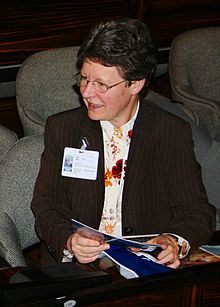Jocelyn Bell
|
Dame Jocelyn Bell Burnell DBE FRS FRSE FRAS |
|||
|---|---|---|---|

Bell Burnell in 2009
|
|||
| Born | Susan Jocelyn Bell 15 July 1943 Lurgan, County Armagh, Northern Ireland |
||
| Nationality | British | ||
| Fields | Astrophysics | ||
| Institutions | |||
| Alma mater |
|
||
| Thesis | The Measurement of radio source diameters using a diffraction method. (1968) | ||
| Doctoral advisor | Antony Hewish | ||
| Known for | Discovering the first four pulsars | ||
| Influences |
Fred Hoyle Frontiers of Astronomy (1955) Mr Tillott (her school physics teacher) |
||
| Notable awards |
Herschel Medal (1989) FRS (2003) FRSE (2004) DBE (2007) |
||
| Spouse | Martin Burnell (1968–93; divorced); 1 child | ||
|
Website Official Website |
|||
|
|||
Dame Susan Jocelyn Bell Burnell DBE FRS FRSE FRAS (born 15 July 1943) is a Northern Irish astrophysicist. As a postgraduate student, she discovered the first radio pulsars while studying and advised by her thesis supervisor Antony Hewish, for which Hewish shared the Nobel Prize in Physics with astronomer Martin Ryle, while Bell Burnell was excluded, despite having been the first to observe and precisely analyse the pulsars. Bell Burnell was President of the Royal Astronomical Society from 2002 to 2004, president of the Institute of Physics from October 2008 until October 2010, and was interim president following the death of her successor, Marshall Stoneham, in early 2011. She was succeeded in October 2011 by Sir Peter Knight. Bell Burnell was elected as President of the Royal Society of Edinburgh in October 2014. In March 2013 she was elected Pro-Chancellor of the University of Dublin.
The paper announcing the discovery of pulsars had five authors. Hewish's name was listed first, Bell's second. Hewish was awarded the Nobel Prize, along with Martin Ryle, without the inclusion of Bell as a co-recipient. Many prominent astronomers criticised this omission, including Sir Fred Hoyle. The Royal Swedish Academy of Sciences, in their press release announcing the 1974 Nobel Prize in Physics, cited Ryle and Hewish for their pioneering work in radio-astrophysics, with particular mention of Ryle's work on aperture-synthesis technique, and Hewish's decisive role in the discovery of pulsars.
...
Wikipedia
